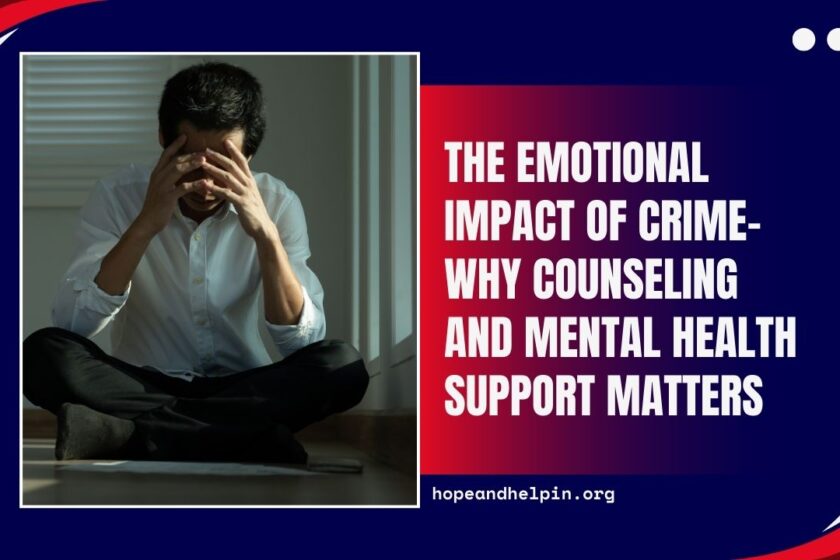Crime does not only cause physical damage or financial loss; it also leaves behind deep emotional scars. Victims, families, and even communities often face fear, stress, anxiety, and depression after a crime.
Many people struggle silently, not realizing that proper counseling and mental health support can help them heal and rebuild their lives.
How Crime Affects Emotions
When someone experiences or witnesses a crime, their life changes instantly. The impact is not only about money or safety—it’s about how they feel inside.
- Fear and Anxiety: Victims may always feel unsafe, even in familiar places.
- Anger and Frustration: Many feel angry about the unfairness of the situation.
- Guilt and Shame: Some blame themselves even if it wasn’t their fault.
- Depression: Continuous sadness and loss of interest in life can follow.
- Post-Traumatic Stress Disorder (PTSD): Flashbacks, nightmares, and sudden panic are common.
Why Mental Health Support Matters
Ignoring mental health after crime can lead to long-term suffering. Support from professionals and community groups can make healing easier.
- Counseling gives a safe space to talk about feelings.
- Therapists provide coping tools to manage stress and trauma.
- Support groups connect victims with others who have faced similar issues.
- Family counseling helps loved ones understand what the victim is going through.
Types of Counseling for Crime Victims
Different types of counseling are available to suit different needs:
- Individual Therapy – One-on-one sessions with a psychologist or counselor.
- Group Therapy – Victims share experiences with others in a safe setting.
- Family Therapy – Helps families rebuild trust and relationships after crime.
- Trauma-Focused Therapy – Special methods like CBT (Cognitive Behavioral Therapy) or EMDR (Eye Movement Desensitization and Reprocessing) that target trauma.
Benefits of Counseling After Crime
Getting professional help can change a victim’s life. Here are the main benefits:
- Reduces fear and stress so victims can feel safe again.
- Improves sleep and health by managing anxiety.
- Builds confidence to return to normal life.
- Prevents long-term mental illness by addressing trauma early.
- Restores relationships by improving communication and trust.
Emotional Effects of Crime and Support Solutions
| Emotional Effect | How Counseling Helps |
|---|---|
| Fear and Anxiety | Teaches relaxation techniques, coping strategies |
| Anger and Frustration | Provides safe outlet to express emotions |
| Guilt and Shame | Helps victims understand it’s not their fault |
| Depression | Encourages positive habits and therapy support |
| PTSD (Post-Traumatic Stress) | Reduces flashbacks and nightmares with therapy |
Community and Government Role
Counseling is not just a personal choice—it is also a community responsibility. Governments and NGOs often provide free or low-cost support programs for victims. Schools, workplaces, and religious organizations also run awareness campaigns to reduce stigma and encourage people to seek help.
How to Seek Help After a Crime
If you or someone you know has been affected by crime:
- Contact local counseling services – Many cities have free support lines.
- Join a support group – Talking to people who understand makes recovery easier.
- Speak to your doctor – They can refer you to mental health professionals.
- Use online counseling platforms – Helpful for those who want privacy.
The emotional impact of crime is often hidden but very powerful. Victims may feel fear, depression, anger, or guilt, and without help, these feelings can last for years. Counseling and mental health support give victims the tools they need to heal, recover, and live normal lives again.
Communities and governments must also support victims by providing easy access to therapy, awareness programs, and safe spaces. Healing takes time, but with the right help, recovery is always possible.
FAQs
Why do victims of crime need counseling?
Victims of crime need counseling because it helps them process trauma, reduce fear, and rebuild confidence to live normally again.
What are the common emotional effects after a crime?
The most common effects are fear, anxiety, depression, guilt, and sometimes PTSD. These can be managed with professional help.
Can family members also get counseling?
Yes. Family counseling is very important because crime affects the whole family, not just the direct victim.

